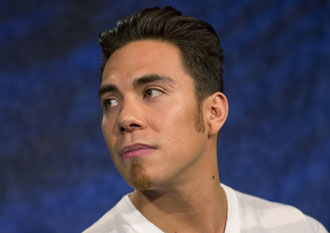The most decorated US Winter Olympian revealed Wednesday that he won’t be competing at the 2014 Sochi Games though he plans to be there as a sports commentator.
“I’ll be in Sochi but I definitely won’t be trying out,” he told Reuters. “I’ll be with NBC. There’s been no official retirement party, I’ve not had a press conference to say I’m retired but it’s pretty safe to say.”
Ohno said he had continued training all this time to keep open the option of competing for the US team at Sochi though he hasn’t competed since the 2010 Vancouver Games.
“In the back of my head I had reservations about saying yes or no because I am a competitor, I am an athlete,” he said. “I love to compete and I love to train and I love the lifestyle of an Olympic athlete and I love what it means to call yourself an Olympic athlete.
“But there comes a time in every single man and woman’s life where you are able to be happy about your existing career. And I’ve accomplished all my goals.”
It has been a half-dozen years since short track skating has been Ohno’s sole focus. In 2006 he took a year’s hiatus from competitive skating. During that time he launched a nutritional supplement called 8 Zone. In early 2007 he competed in Dancing with the Stars ABC TV reality show and won, greatly enhancing his celebrity status.
At the age of 30 Ohno is best known as the athlete who made short track skating a marquee event for Americans. Part of the excitement came from his fierce rivalry with the Korean team which had dominated short track skating before his emergence. What really put the event on the map was the 1000-meter race at the 2002 Salt Lake City games. Ohno, who had been in second place, raised an arm to indicate his move to take the lead had been blocked by the Korean skater in the lead. The judges made the controversial decision to disqualify the Korean for cross-tracking, giving Ohno the gold and instantly making him public enemy number one in S. Korea.
Ohno has won eight Olympic medals — including two golds, two silvers and four bronzes — in four separate Olympics, setting a US record for the most winter Olympic medals. His golds were in the 1,500-meter final at the 2002 Salt Lake City Olympic Games and the 500-meter final at the 2006 Turin Games.
His Dancing with the Stars win made Ohno one of America’s most recognizable athletes. The next year he was even a guest judge on the fashion reality show Project Runway and landed an endorsement deal with Omega a year later. Since then he has added as sponsors McDonald’s, General Electric, The Century Council, Vicks, Coca-Cola and Alaska Airlines.
Ohno has been active in leading various charitable campaigns, including one to fight HIV/AIDS in Africa, the Salvation Army, Ronald McDonald House, a drive to provide care to Japanese elders in the Pacific Northwest and a crusade to promote math and science education. His latest cause is raising awareness for exercise-induced bronchospasm (EIB), a condition from which he had suffered his entire career.
“I didn’t speak about it all,” he revealed recently. “First of all, I didn’t know many people had exercise-induced bronchospasm. And secondly, I wasn’t comfortable at the time talking about it. As an athlete you’re taught to show no weaknesses… like there’s an invisible shield around you.
“I had one of the most severe cases of EIB but immediately after I began treatment, I noticed a huge difference in my performance and I felt like I was competing on a level playing field.”
Ohno’s recent focus on a career in TV broadcasting has included hosting his own game show and signing a deal as a commentator for NBC Sports.
Apolo Anton Ohno was born May 22, 1982 in Seattle to a Japanese father named Yuki and a caucasian mother named Jerrie. Yuki had immigrated alone from Tokyo at the age of 18. He quickly dropped out of accounting studies at Seattle City College in favor of the less cerebral profession of cosmetology. He opened his own Seattle beauty salon and enjoyed enough success to party nightly with other young hairdressers. He was 36 when he married Jerrie.
Apolo was only one when the couple divorced after just a year of marriage. Yuki got custody and raised him alone. To make ends meet Yuki had to moonlight at a second salon. From the age of eight Apolo was forced to fend for himself after school until his father finished work. That left many unsupervised hours for Apolo. By the time he was 12 Apolo began falling in with an tough older crowd.
To occupy his son’s energies more constructively, a worried Yuki got him involved with swimming. Apolo won a breastroke championship that year. He also took up rollerblading and became national champ in the 1000 meters at the age of 14. But after watching TV coverage of short-track skating from the 1994 Lillehammer Olympics, Apolo began focusing on skating. A year later he won a national junior championship.
Apolo was so surprisingly good that father and son set their sights on qualifying for the 1998 Nagano games. The combination of pressure and inexperience proved too much. In the Olympic trials Apolo came in 16th out of 16 hopefuls and failed to make the team. For some time his ultimate comeback was doubtful, then painful, but ultimately successful beyond the Ohnos’ wildest expectations.
It was at the Salt Lake City Games that Ohno would emerge as America’s favorite winter Olympian.


